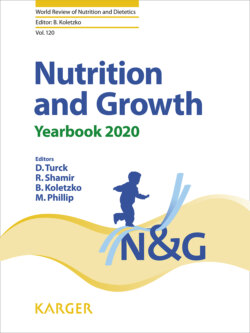Читать книгу Nutrition and Growth - Группа авторов - Страница 37
На сайте Литреса книга снята с продажи.
Exposure to improved nutrition from conception to age 2 years and adult cardiometabolic disease risk: a modelling study
ОглавлениеFord ND1, Behrman JR2, Hoddinott JF3, Maluccio JA4, Martorell R1, Ramirez-Zea M5, Stein AD1
1Hubert Department of Global Health, Rollins School of Public Health Emory University, Atlanta, GA, USA; 2Departments of Economics and Sociology, School of Arts and Sciences, University of Pennsylvania, Philadelphia, PA, USA; 3Division of Nutritional Sciences and Charles H Dyson School of Applied Economics and Management, Cornell University, Ithaca, NY, USA; 4Department of Economics, Middlebury College, Middlebury, VT, USA; 5Institute of Nutrition of Central America and Panama Research Center for the Prevention of Chronic Diseases, Institute of Nutrition of Central America and Panama, Guatemala City, Guatemala
Lancet Glob Health 2018;6:e875–e884
Background: Low-income and middle-income countries with populations that are chronically undernourished in early life are undergoing a nutrition transition and are experiencing an epidemic of cardiometabolic disease. These dual burdens are thought to be causally related; therefore, the extent to which improvements in early-life nutrition can offset adult-onset disease is important. The aim of this study was to examine whether improvement of protein-energy nutrition from conception to age 2 years can attenuate the risk of cardiometabolic disease.
Methods: We followed up a cohort of 2,392 individuals born between January 1, 1962, and February 28, 1977, in 4 villages in Guatemala who had participated in a cluster-randomised protein-energy nutritional supplementation (Atole) trial. Of 1,661 participants available for follow-up from February 26, 2015, to April 29, 2017, we studied 684 women and 455 men. We assessed cardiometabolic disease risk at ages 37–54 years using anthropometry, fasting and post-challenge glucose, fasting lipid concentrations, and blood pressure. We used generalised linear and logistic regression modelling to estimate the effect of Atole from conception to age 2 years (the first 1,000 days) on cardiometabolic disease risk.
Findings: Exposure to Atole from conception to age 2 years was associated with increased fatness (body-mass index [1.29 kg/m2, 95% CI 0.08 to 2.50], body fat [1.73%, 0.20 to 3.26], and obesity [OR 1.94, 1.11 to 3.40]), diastolic blood pressure (1.59 mm Hg, –0.74 to 3.92), and blood lipids (total cholesterol [10.10 mg/dL, 0.80 to 19.40] and non-HDL cholesterol [10.41 mg/dL, 1.51 to 19.31]), reduced post-challenge glucose (–5·84 mg/dL, –12.51 to 0.83), and reduced odds of diabetes (odds ratio 0.46, 0.21 to 0.97). We found stratum heterogeneity by sex in pooled models for non-HDL cholesterol (4.34 mg/dL, 95% CI –6.86 to 15.55 for women vs. 19.84 mg/dL, 5.86 to 33.82 for men) and post-challenge glucose (–0.19 mg/dL, –8.63 to 8.24 for women vs. –13.10 mg/dL, –23.64 to –2·56 for men). P values for interaction of sex and exposure to Atole from conception to age 2 years were 0·09 and 0·04, respectively.
Interpretation: Improved protein-energy nutrition from conception to the 2nd birthday reduced the odds of diabetes at ages 37–54 years; however, this protein-energy supplementation also increased the risk of obesity and several obesity-related conditions. Our findings suggest a mixed ability of protein-energy nutritional supplementation in early life to prevent adult cardiometabolic disease incidence in the context of high childhood stunting and high adult overweight and obesity.
Reprinted with permission from Elsevier.
| Comments | Inadequate nutrition and impaired development in utero and during early life are thought to increase the risk of cardiometabolic disease in adulthood [13].This study examined the effect of a nutritional supplementation intervention from conception to age 2 years (the first 1,000 days) on cardiometabolic disease risk in midlife. Using experimental data from a longitudinal cohort with more than 40 years of followup, the authors reported a beneficial and detrimental effect of a protein-energy nutritional supplement (Atole) from conception to age 2 years on the cardiometabolic disease risk profile in Guatemalan adults. Exposure to Atole increased adiposity and caused a more atherogenic blood-lipid profile (total cholesterol and non-HDL cholesterol), but it had a strong inverse association with diabetes that was not mediated through measures of adiposity. Overall, the evidence from this cohort suggests that protein-energy nutritional supplementation has mixed ability to offset the incidence of adult cardiometabolic disease in contexts of chronic childhood undernutrition and obesogenic adult environments.The strengths of the study include its long-term follow-up and the large number of participants.The study findings worth the efforts trying to develop a different nutritional supplementation for the first 1,000 days of life that not only decrease the risk of diabetes but also can improve the atherogenic profile. |
______________________
